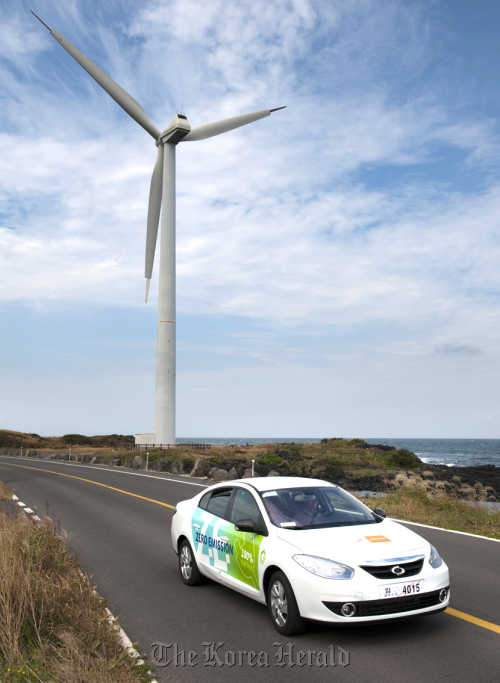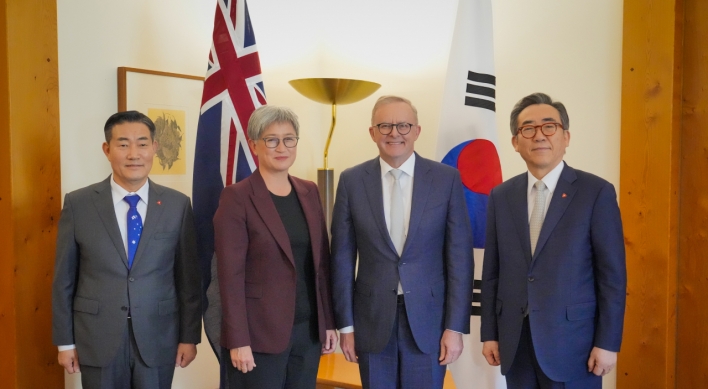Renault Samsung says state support required for cars with replaceable batteriesThe
Renault Samsung Motors said Sunday that it is working to produce an all-electric version of its mid-sized SM3 sedan next year with replaceable batteries that can be exchanged at drive-in facilities.
The Korean unit of the French carmaker has the goal of launching 250 “zero-emission” vehicles by December 2012 to show its commitment in clean energy vehicles, while key requirements for the plan would involve policymakers’ support and power-grid infrastructure.
“Our Busan plant will soon mass-produce all-electric vehicles and we chose to adopt what is called ‘quick-drop battery exchange system’ where drivers can simply replace batteries in a matter of minutes,” a Renault Samsung spokesman said.
Renault Samsung Motors said Sunday that it is working to produce an all-electric version of its mid-sized SM3 sedan next year with replaceable batteries that can be exchanged at drive-in facilities.
The Korean unit of the French carmaker has the goal of launching 250 “zero-emission” vehicles by December 2012 to show its commitment in clean energy vehicles, while key requirements for the plan would involve policymakers’ support and power-grid infrastructure.
“Our Busan plant will soon mass-produce all-electric vehicles and we chose to adopt what is called ‘quick-drop battery exchange system’ where drivers can simply replace batteries in a matter of minutes,” a Renault Samsung spokesman said.

The choice was inevitable, as one of the two main challenges that has slowed the progress is with their long recharging times and short ranges. With the “quick-drop battery exchange system,” it envisions solving the problem as drivers can take empty batteries out of cars and replace them with fully charged ones at local service centers.
Charged once, the electric SM3 will be able to travel up to 160 kilometers, the company said. The zero-emission vehicles will be equipped with a 250 kilogram lithium-ion battery in the boot, which can be removed through a fully automated system at a battery-replacement station in less than 90 seconds.
The company plans to place the battery pack directly behind the rear seats rather than beneath the car’s floor, extending the rear of the electric model by 13 centimeters.
Renault Samsung plans to produce 13,000 SM3 ZE electric subcompact vehicles from its Busan plant until 2015.
“Production for sale is also on the way, but when that would come about depends on how quickly we can build infrastructure for the battery swap technology,” the automaker said in a statement.
Another challenge is the lack of infrastructure ― an area that cannot be completed without state support.
The Ministry of Knowledge Economy earlier this month said it would spend about 70 billion won ($65 million) on electric-vehicle development by 2014, including building of electric charging stations.
The Korean Agency for Technology and Standards, an agency under the Ministry of Knowledge Economy, in June said it would come up with three Korean Industrial Standards for electric vehicle charging.
It will involve general requirements for charging systems, such as cable, plug and inlet standards, but it didn’t confirm whether battery replacement stations will be included in the list.
The battery swap technology has been developed by the Renault-Nissan alliance, which hopes to create a mass market for both a new electric motor technology and a new logistical structure to make power supply easier than ever.
The French-Japanese alliance predicts electric vehicles to account for 10 percent of the auto market by 2020.
By Cynthia J. Kim (cynthiak@heraldcorp.com)
-
Articles by Korea Herald





![[Herald Interview] Mom’s Touch seeks to replicate success in Japan](http://res.heraldm.com/phpwas/restmb_idxmake.php?idx=644&simg=/content/image/2024/04/29/20240429050568_0.jpg&u=)




![[News Focus] Lee tells Yoon that he has governed without political dialogue](http://res.heraldm.com/phpwas/restmb_idxmake.php?idx=644&simg=/content/image/2024/04/29/20240429050696_0.jpg&u=20240429210658)








![[Today’s K-pop] Seventeen sets sales record with best-of album](http://res.heraldm.com/phpwas/restmb_idxmake.php?idx=642&simg=/content/image/2024/04/30/20240430050818_0.jpg&u=)